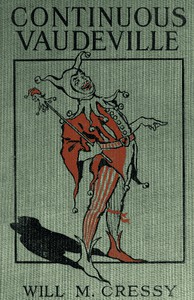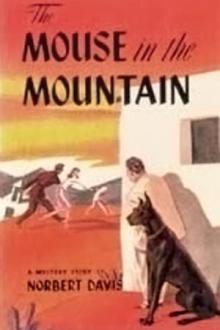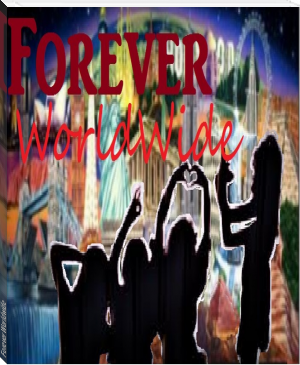Continuous Vaudeville, Will M. Cressy [top 10 inspirational books TXT] 📗

- Author: Will M. Cressy
Book online «Continuous Vaudeville, Will M. Cressy [top 10 inspirational books TXT] 📗». Author Will M. Cressy
Two weeks later a letter came to St. Louis stat[62]ing that Abner was afflicted, but very slightly.
At Milwaukee a week later the third letter came, describing in detail the last sad rites attending the death and burial of Abner.
As the weeks passed by Mrs. Ryan grew resigned and Tommie grew happy. And then came their engagement at Buffalo. Upon arrival at the theater, Tommie found eleven letters; one was from the livery stable man at home; this one he slipped into his overcoat pocket for a private reading later on. While he was reading the other ten, his turn came to rehearse his music; he slipped the ten letters into the same pocket with the livery stable man's letter, and forgot all about the whole lot.
Arriving at the hotel, Mrs. Ryan asked him for the mail and he handed the whole lot over to her. The first one that she opened was the livery stable man's. It stated that the family he had given Abner to, according to Tom's directions, had just been arrested for beating and starving Abner.
I can't tell the rest; it is too sad; but to this day, every time Mrs. Ryan thinks of Abner, she looks at Tommie, and he goes out and sits in the Park.[63]
"Thou Shalt Not Steal," said the sign in the car.
The conductor looked at it and laughed "ha ha."
And he pinched four dollars, and whistled the air,
"None but the brave deserve the fare."
After six weeks' travel the Harry Lauder Company had reached San Francisco; every night of that six weeks Hugo Morris had taken Lauder out to some restaurant to exhibit and feed him. On this first night in San Francisco, the show had been an uncommonly large success, and "Spendthrift Harry" was feeling generous. So he said to Hugo,
"Wull, Hugo, I bane thinkin'; every nicht sen we left New York you ha' taken me oot as your guest; you ha' entertained me grand; I ha' never seen anything like it in ma own country. An' I ha come to the conclusion tha' it is not richt for me to let yo' do a' the treatin'. An' so to-nicht I wi' toss yo' a penny to see who pays for the supper."
He did so, and Hugo got stuck.
[64]
Wouldn't Alan Dale feel at home in a "Pan"tages theater?
 "Shun Licker."
"Shun Licker."
One morning in Chicago I received a pressing invitation to come over to the police station and bail out "A Fallen Star." Upon arriving there I found the aforesaid Star sitting on the edge of his bunk holding his head in his hands and wishing it had never happened.
Like all Good Samaritans I started in delivering a Frances Murphy to him; I told him how he was ruining his health, fortune and reputation; I was really making quite a hit—with myself. Suddenly a rat scampered along the corridor by[65] the door. The Fallen Star saw it, started, glanced sharply at me, then regained his composure. I was going ahead with my temperance lecture, when he glanced up at me a second time and said sharply,
"I know what you think; you think I think I saw a rat—but I didn't."
One summer we took our Property Man up on the farm in New Hampshire with us; one day my wife was trying to describe a man that she wanted him to find over to the village:
"He is a rather stout man," she said; "has reddish hair, wears blue glasses and has locomotor ataxia."
"Oh, yes," interrupted the Property Man, "I seen it; he keeps it up in George Blodgett's barn; I see it every night when I go after the cow."
The manager of a little theater in Des Moines closed an act on a Thursday; I asked him what the matter was with the actor:
"Too officious, front and back."
B. F. Keith had two theaters in Philadelphia; one on Eighth Street and one on Chestnut Street.[66] One week while we were appearing at the Chestnut Street house one of the papers had a picture of me. Not having space enough for the whole name of the theater, they cut it down so that the announcement read—
"WILL M. CRESSY. KEITH'S CHESTNUT."
 The Widow's Mite.
The Widow's Mite.
The train had stopped at Reno for a few minutes; it was just at dusk and as the night was warm we got out and were walking up and down the platform. There was a billboard at the end[67] of the station and the bill poster was pasting up some paper advertising the coming of "The Widow's Mite" Company. An old chap came along, stopped and looked at it, but, owing to the poor light could not quite make out what it was; so he said to the bill poster,
"What show is it, Bill?"
"The Widow's Mite."
The old fellow pondered on it for a moment, then as he turned away he said, half to himself,
"Might? They do."
One night in San Francisco, Bonnie Thornton woke up, heard a suspicious noise in the next room, and nudged Jim, her husband.
"What's the matter?" inquired Jim.
"There is a burglar in the other room," said Bonnie.
"How do you know?"
"I can hear him."
There was a pause, then she whispered excitedly,
"Jim, he is under the bed."
"No, he isn't," said Jim.
"How do you know he isn't?"
"Because I am under there."
[68]
Jack Wilson went into an auto supply store in New York and wanted to buy a pedometer for his car.
"A speedometer you mean, don't you?" said the clerk, smiling.
"No; I want a pedometer," said Jack.
"But," persisted the clerk, "a pedometer is for registering how far you have walked. You don't want that on your car."
"Humph," said Jack, "you don't know my car."
A Critic had criticized me rather severely, and then, not satisfied with that, had come around to see me and tell wherein I was wrong.
"See here," I said, "how is it that you, a newspaper man here in a small town; a man that never wrote a play; never produced a play; and never played a part in your life; how is it that you feel competent to give lessons to me, who have made a life's study of this line of work?"
"Well," he said slowly, "it is true that I never wrote, produced or took part in a play. Neither have I ever laid an egg. But I consider myself a better judge of an omelette than any hen that ever lived."
[69]There was a kind of a R.S.V.P. in his tone but I did not have any answer to make right at the time.
 Far from Home and Kindred.
Far from Home and Kindred.
It was at a little station way out on the plains of Nebraska. There were exactly sixteen houses in sight. Two men met just outside our window.
"Why, hello, Henry," said one; "what are you doin' down town?"
[70]
VAUDEVILLE VS. THE LEGITIMATEA few years ago a handsome, immaculate young man came over to me as I was sitting in the office of the Adams House in Boston and said,
"Mr. Cressy, my name is so-and-so; I am an actor; a good actor too, and I have always been very proud of my profession. My mother is one of the most popular actresses in America to-day. But last summer I had an experience that set me to thinking a little. As you were mixed up in it I am going to tell it to you.
"Last season I was out with a company that made one of those 'artistic successes,' but which did not seem to interest the public very much. As a result, when the merry springtime came around, I had a trunk full of good clothes, good press notices and I.O.U.'s from the manager, but not a dollar in money.
"But I was fortunate enough to receive an invitation from a luckier actor friend to spend a month at his summer home on the shores of Lake[71] Sunapee, N. H. Did I went? I did went! Quick.
"He had a beautiful home. And I was certainly some class; I had linens, flannels, yachting clothes, tennis clothes, evening clothes; in fact I had everything but money.
"One night we were sitting down on his little wharf enjoying our—no, his—cigars, and a very pretty little launch passed by.
"'Whose launch is that?' I asked.
"'Oh, it belongs to some Vaudeville player by the name of Matthews, I believe. They live over on the other side of the lake. I don't know them.'
"Pretty soon another little launch came into the bay, cruised around the shore, and went.
"'Whose boat is that?' I inquired.
"'That belongs to a Vaudeville fellow by the name of Merritt. I don't know him.'
"A little while after a big cabin launch came into the bay and cruised slowly around. Out on the deck was a party of young folks: two of the girls were playing mandolins and they were all singing.
"'By Jove!' I exclaimed. 'That's a beauty! Whose is it?'
[72]"'Oh, that is Will Cressy's boat,' replied my friend impatiently. 'He is another of those Vaudeville people. There are a number of them over across the lake there, but we don't know them at all.'
"I sat for a while—thinking. Here I was, a recognized Broadway player of legitimate rôles, a man who could play any juvenile Shakespearian rôle without a rehearsal, a member of The Lambs and The Players Clubs. And here I was sitting out on the end of a wharf because I didn't have money enough to hire even a bum rowboat. And the three first launches that had passed by were all owned by Vaudeville players—whom my legitimate friend 'did not know at all.' I thought it all out and then I turned to my friend and said,
"'All right, Tom, but you want to make all you can out of this visit of mine. For the next time I come up here you won't be speaking to me.'
"'Why won't I?' he asked in surprise.
"'Because the next time I come up here I am going to be "one of those Vaudeville players." I am going to have some money in my pocket; and I am going to have a boat; and I am going[73] to sail by here every evening and make faces at you "Legits."'"
Copy of a letter received from the proprietor of a hotel in Youngstown, Ohio:
"To the Manager of the —— Company.
"I can highly recommend you to my hotel we get all the best troups our rates are as follows.
One man or one woman in one bed, $1.25.
Two men, or two women, or one man and one woman in one bed, $1.00.
And the hens lay every day.
"—— ——, Proprietor."
Hanging in each room of the Freeman House at Paterson, N. J., there used to hang a neat little frame of "House Rules." Among these rules were the following:
"Towel Service will be restricted to one clean towel for each guest daily. The face towel of the previous day may (and should) be retained for hand use the following day."
"Gentlemen will not be allowed to visit ladies in their sleeping rooms, nor ladies to visit gentlemen in their rooms except under extenuating circumstances."
[74]
 "Why?"
"Why?"
A little boy playing around the stage door of the Orpheum Theater in Kansas City spoke to me as I came out one afternoon.
"Hello, Mister."
"Hello, young feller."
"Do you work in there?"
"Yes."
"Are you an actor?"
"Yes."
"Why?"
And I couldn't tell him of a single reason.
[75]
A SOCIAL SESSIONBeing "An Outsider's" Views of an Elks' Social Respectfully dedicated to Archie Boyd, a Real Elk.
In a strange town, been invited
To a social of the B. P. O. of E.?
'Twas too early to be sleeping
And the "blues" were o'er you creeping
And you wished that at home you could be.
Got to drifting with the tide
Of Goodfellowship that





Comments (0)